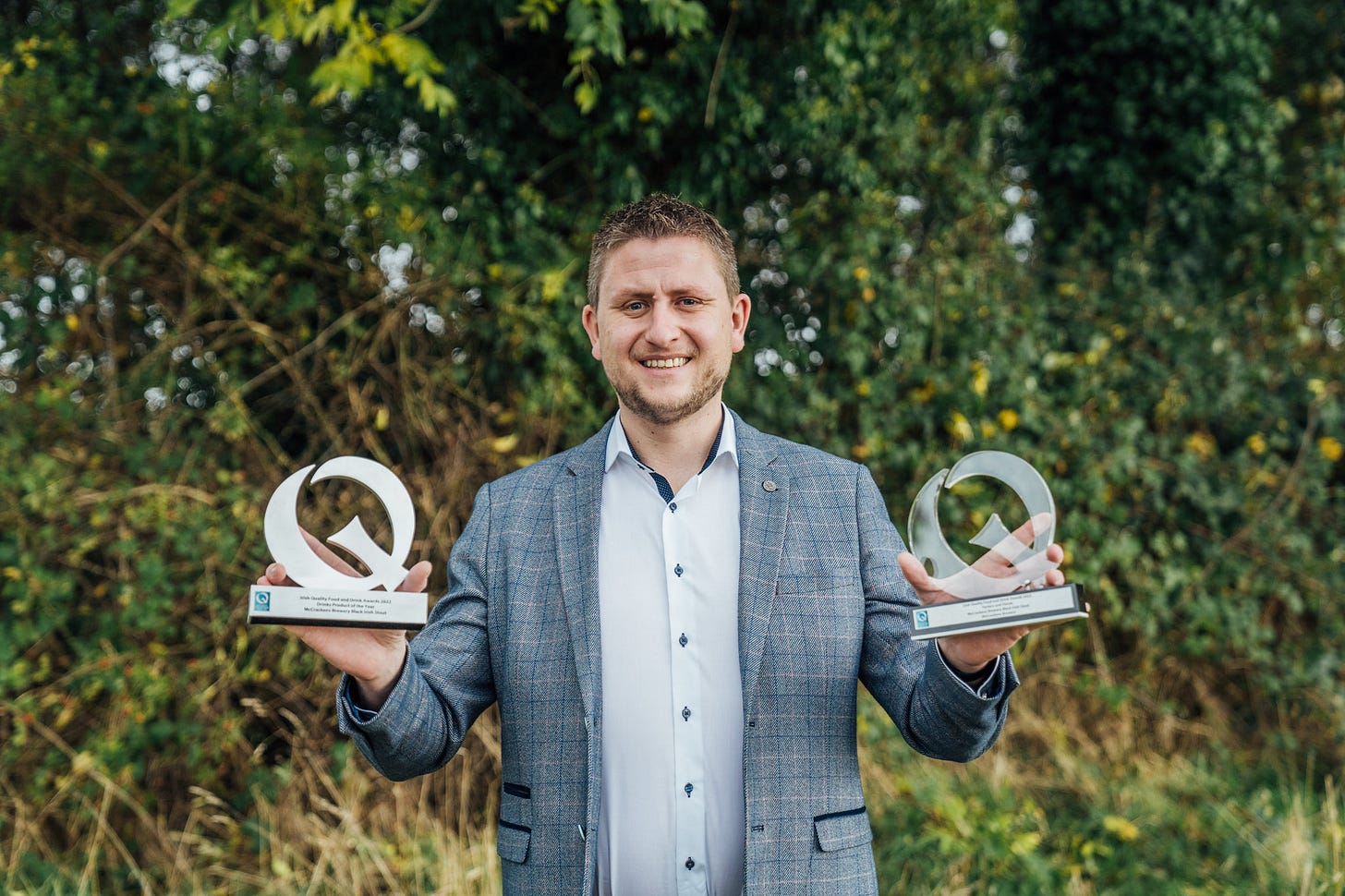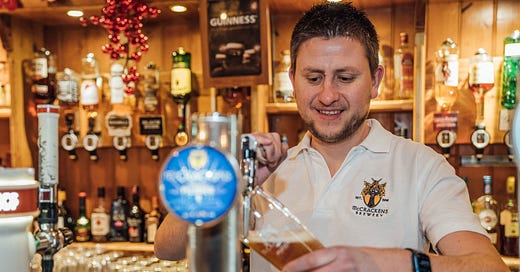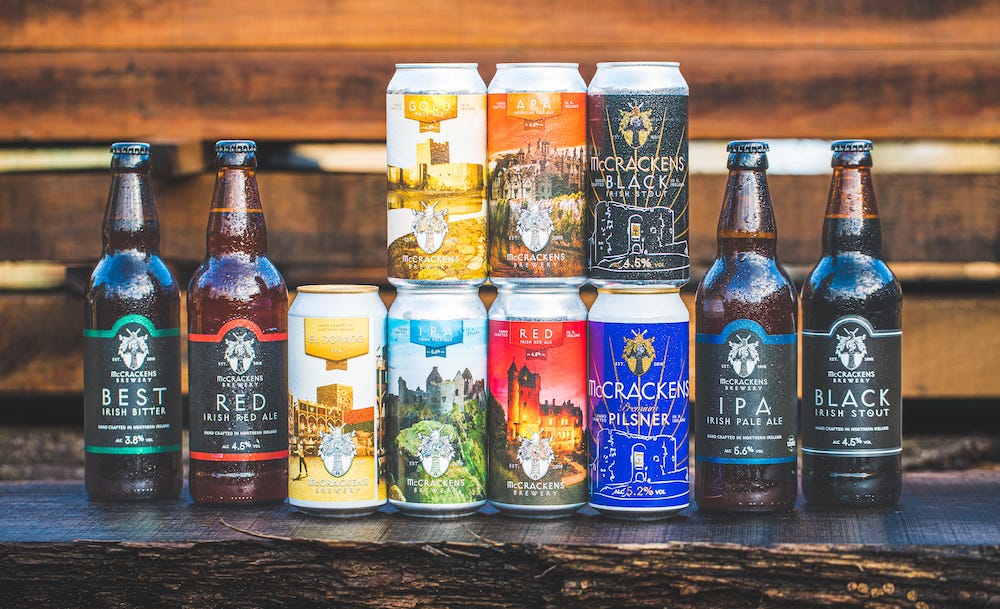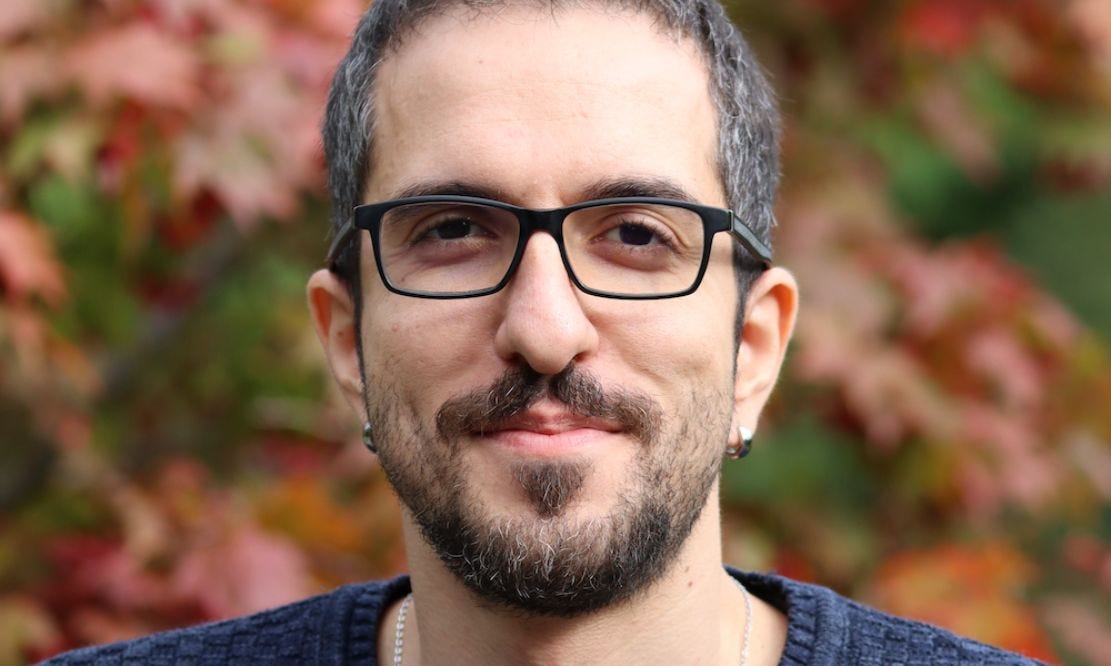McCrackens Brewery: How a home brewing kit one Christmas resulted in a 15,000-litre per month craft brewery
Hello and welcome to Entrepreneur NI – a weekly newsletter brought to you every Sunday morning, showcasing the founders behind some of the best businesses in Northern Ireland. If you haven’t already subscribed, you can do so here..
Ryan McCracken is living his dream, having turned his hobby into a full-time business that now employs four people.
This is the story of how one home brew kit spawned an entire brewery on the outskirts of Portadown in Co Armagh.
It was about 10 years ago when Ryan took a tour of Hilden Brewery in Lisburn. For him, that tour “was the hook”. He was already interested in craft brewing but the idea for McCracken’s Brewery – as we know it today – began as a dream from that day onwards.
Ryan first stumbled upon craft beer when he became tired of the “usual flavourless beer”. For him, craft beer was exciting and something he wanted to delve into.
“I was literally trying all sorts of different beers and then, one Christmas time, my wife, Nicola, asked me ‘what would you like for Christmas?’ And I said, ‘get me a home brew kit’. It was literally a bucket, a packet of extract and that was it. You put water in and a few weeks later you’ve essentially got beer. The first time wasn't that nice; it didn't turn out well at all, but I sort of caught the bug for it then.”
Ryan really embraced the idea of trialling new flavours, comparing ingredients and being able to put them together to produce something really nice and on par with the beers which were professionally brewed. Although small scale, Ryan believed he was onto something.
“I just had a dream then to start my own craft brewery,” he said. “And it was around that time – 2018 – we were looking for a new house and this house (where he lives now with his wife and two children) came up with some bit of land around it, as well as a few outbuildings, so I was able to convert some of those into a brewery essentially.”
Ryan started off small, brewing approximately 300-350 litres each month. That soon became 1,200 litres a month – even that wasn’t enough as demand for the award-winning drinks grew.
“We got to the point relatively quickly where we needed to up production. We were looking at upgrading the brewery but then 2020 hit and we lost 85% of business overnight. It was a tricky time but we recovered after three months and started maxing out again.”
That was all thanks, Ryan says, to an uplift in sales to local off-licenses as well as online sales – helped immeasurably by an Amazon listing.
Related: Ryan turns passion for craft beer into growing success as brewery continues to expand
Brexit brought its own challenges too, but McCracken’s Brewery seized upon an opportunity with one Italian distributor which had lost its English supply. Ryan was able to leverage the single-market and supply them with McCracken’s beers. It was a positive that came at the perfect time – “the upgrade was back on”.
McCracken’s were producing 6,000 litres a month but space-wise, things got pretty cramped.
He needed to further extend and only recently – in the last few months – the brewery has undergone an extension and now has the capacity to produce 15,000 litres a month. It’s now a little more future proofed against further surges in demand.
But bringing it all back to starting a company – Ryan was an enthusiast with no business background. His skills lay in technology and that gave him a little head start when it came to getting his head around the equipment, but he admits “it was daunting”.
“I was pretty confident I'd be able to sell the beer but obviously until you get up and running you don't know for sure. I suppose on a smaller scale, it was actually more difficult because you need to have that capacity there to actually start making any sort of profit.”
He began with a system that mimicked a professional setup as closely as possible. Technology aside, the testing of flavours is the very epitome of trial and error too and it takes time… and a lot of patience.
“It was all a bit of a learning curve to be honest, not only from the production side of things but to everything that comes with running a business. You will be doing everything at the start. I made the beer, sold the beer, a general dogsbody. There was the marketing, the finance and bookkeeping, you name it.
“It's a massive undertaking and I’m still learning and will continue to do so but I found quite early on that everything is daunting but you just have to take a step back.
“I suppose that’s what I did quite early on, was take a step back, break things into smaller chunks and go through one thing at a time, one process at time; and if that means researching how to do something, or figuring something out, or going on a course, do it. Take your time.”
Ryan, like many in his shoes, reached out to the Go For It programme which taught him how to deal with a curveball.
“You can never plan for every eventuality but it’s about being able to take that scenario and dealing with it as effectively as possible.”
The programme covered all the soft skills, from marketing, social media, compiling a business plan for banks should any finance be required.
“It was good to use the programme as a sounding board to make sure I was on the right track because I had never started a business before.”
Ryan went on to complete a drinks producers course through Invest NI which opened doors to experts and other startups which have taken off over the last few years.
“It was good to hear things from different perspectives and, again, we've developed connections and built up that network with other local drinks producers. Everybody starting out makes some mistakes and it’s good to hear what not to do and it’s good for us to advise others too.
“Even though other breweries are our competitors it is still a close-knit community in Northern Ireland if we need help. You just pick up the phone and ask; people ask us all the time and where you can help, you help.”
McCracken’s Brewery has been mostly all self-funded – as the business has grown, so have the facilities but those go hand in hand. DAERA supplied a small bit of funding for a number of fermenters but what comes out of the business tends to go back in. It’s a patience game for Ryan who is well aware of the pitfalls of massive growth. Thankfully, over time, the processes have become easier.
“We've got people in to help us brew and package; we've got distributors that take the stuff on and sell. We're not doing so much running around which has freed up time to focus on the actual running of the business and building the business up in that regard.”

Ambitions of growing further are never too far in the back of Ryan’s mind. While canning has been outsourced, that’s something Ryan envisages may be brought back in-house now the extension has been completed.
“I don’t necessarily look at what's happening right now but rather what's happening, or will be happening, in the next six to 12 months. I need to start planning for that now. I need to have the resource in to meet the demand.
“In that sense I’m always looking for more space. In order to keep moving forward you need to take a risk, and that is increasing production when you don’t necessarily have the actual outlets at this moment in time, but you need to have in place to actually get more business.
“We're working with a couple of people at the minute, whereby, if we got those deals, we're going have to increase things quite considerably, so we're always keeping an eye ahead to see what we may need in the future.”
From just Ryan at the beginning to a proper operational, manned brewery, McCracken’s Brewery has come a long way from that home brew kit bought one Christmas. Now an award-winning brewery on an upward trajectory.
For Ryan “it has been a bit of a rollercoaster” but rollercoasters tend to be fun, don’t they?!
Job Profile
After moving to Northern Ireland to complete his PhD, Kerem Osman Çubuk later became involved with Armagh Observatory and Planetarium and has now taken up the post of Education Officer.
Previous Issues
'Tesla for tractors' - meet the entrepreneur using AI to save lives on the farm and on site
Chef forced to give up career on health grounds now cooking up a storm with her own business
Succession: The daughter who turned dad's 40-year plant hire firm into a thriving business









